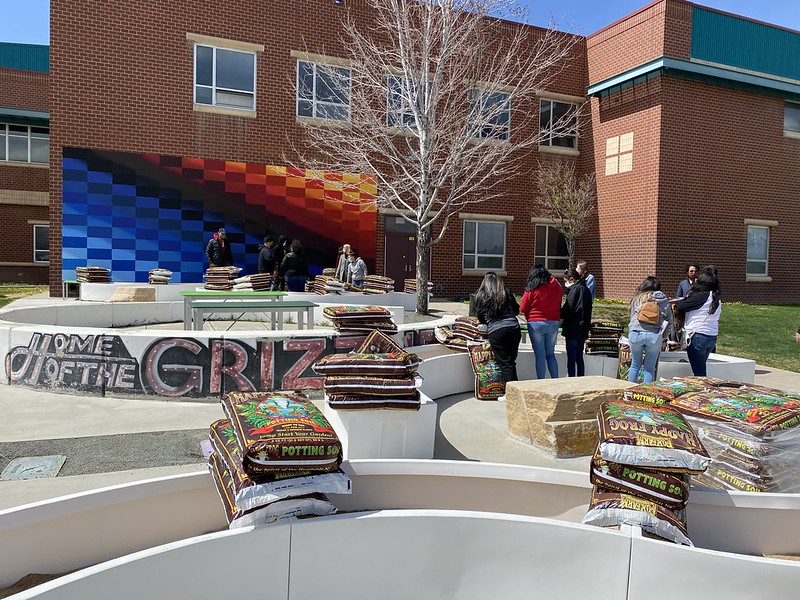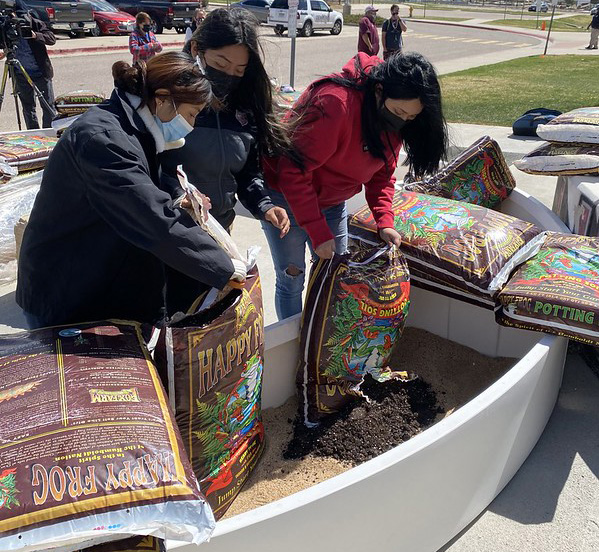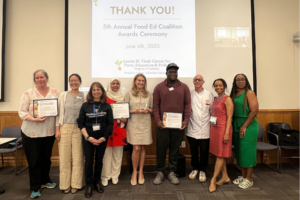By Stacy Nick | Published January 23, 2022 on Colorado State University
It started with a seed of an idea: find a way to get students at Bruce Randolph School interested in agriculture and food systems.
“We just started asking, ‘What if…’” said Traci Sanchez, a career and technical education specialist with Denver Public Schools.
With help from Colorado State University and other partners from across the state and the country, that “what if” grew into the AgConnect Pathway. The DPS career and technical education program piloted the agriculture-based curriculum at Bruce Randolph School, which serves grades 6-12 in north Denver, teaching them not only about where their food comes from and how to grow food, but also helping them explore the advanced technologies that produce that food, along with the higher education paths that could lead to a career in agriculture.
The program is the latest in DPS’s pathway effort that anchors schools in different career path-focused curriculums from engineering to business to the creative arts.
“It’s really about thinking about the future,” Sanchez said. “And how do we empower our students to be partners and thought leaders in establishing new technologies and to be the leaders of change for our future.”
Growing food in a food desert

Globeville and Elyria-Swansea are among the home neighborhoods that Bruce Randolph School serves and are located on former Superfund sites designated for cleanup of hazardous material contaminants, said Bruce Randolph Principal Melissa Boyd. Because of concerns regarding arsenic and other pollutants in the soil, traditional gardening efforts are challenging. It’s also not something many of the kids have done before due to living in an urban community.
“When we look at the daily life of our kids, they don’t have experience with gardening,” Boyd said.
The neighborhoods are also right in the middle of a food desert where the closest fresh produce is miles away. The only place to get fresh fruits and vegetables in the neighborhood used to be at a nearby Walgreens, Boyd said. But even that store stopped stocking non-shelf stable foods when the COVID-19 pandemic began.
That lack of access to healthy food is exactly why a sustainable, urban agriculture program was a perfect fit for the school, she said. It was an opportunity to show students not only how to grow their own food, but to tie that process to the importance of healthy, nutritious foods in their everyday lives.
It also connects back to the school’s namesake, “Daddy” Bruce Randolph. For 30 years, the Denver barbecue restaurant owner made it his mission to feed people in need during the holiday season.
A growing idea
For more than five years, the CSU System has partnered with Bruce Randolph to create a beta test for the AgConnect Pathway program with the focus specifically on the next wave in sustainable, urban agriculture, Sanchez said.

With the help of the CSU System, the school leveraged a partnership with national food nonprofit The Big Green to install an outdoor teaching garden. Additionally, with the aid of partners Teens for Food Justice and a $500,000 Healthy Foods for Denver’s Kids grant, a hydroponic farm was recently constructed at the school and an indoor greenhouse is set to be completed this summer. The goal is to eventually harvest up to 150 pounds worth of produce a week, Sanchez said. That food will go back to students via the school’s cafeteria.
“Our food and nutrition services team has agreed to purchase any of the produce grown as long as we follow all the food safety protocols, which is another part of the program’s focus,” Sanchez said, adding that eventually, they’d like to add an agricultural business program to teach students more about the marketing, distribution and sales aspects of the industry.
The school will also work with CSU System’s newest addition, its CSU Spur campus. The free, public destination located at the National Western Center in Denver offers educational opportunities focused on food, water and health. The campus’ Terra building – opening in April – will focus on food and agriculture, offering students access to rooftop greenhouses, a food lab and the latest in urban agriculture research.
“With all of this, the sky’s the limit as to where we can go with agriculture in Denver Public Schools,” Sanchez said. “And we’re just taking the first steps. This will help us to build more programs that are aligned to our students’ interests as well as to what the industry will need.”
Growing a path to higher education
In the Fall 2021 semester, the collaboration between the University and the school took another step forward with the creation of the Extended Campus dual enrollment course, Horticulture 100.
In the hybrid online/in-person class, high school students take a college-level course and learn the basics of plants following the same coursework that CSU students do, including lab work like dissecting flowers and plant propagation, said Jennifer Bousselot, the assistant professor teaching the course.
For years, CSU’s Department of Horticulture and Landscape Architecture has been looking at ways to reach out to high school students, not only to recruit for the department but also to show horticulture as a career option, Bousselot said.
“I hear a lot of, ‘I didn’t know there was so much to horticulture,’ and ‘I didn’t know there were so many opportunities and areas that I could actually have a career in,’” she said. “So, I think it already has been very eye-opening for students.”
The class fulfills not only a DPS science requirement, but also offers college credit that can help students get an early start toward higher education, Bousselot said. In addition, it prepares students for the college experience, including how to listen for key elements in a lecture, take notes and prepare for exams.
Bruce Randolph junior Amaris Casillas isn’t sure what kind of career she wants to pursue but said she knew taking the Horticulture 100 class was a smart move.
“I know pretty well the best ways for me to learn and one of those is applying what I have learned and doing something hands-on,” Casillas, 17, said. “This class offered me that through its labs, and I feel that it has helped me grasp the ideas taught even more.”
In addition to helping her prepare for college, Casillas said she’s already putting lessons from the class to use, making improvements to her family’s pandemic garden.
Making college accessible
Over the years, there have been many ways that the CSU System and its institutions have supported Bruce Randolph’s programing and helped to infuse more of a college and career focus, Boyd said. That includes working to make the programs educational, engaging and accessible.
But while bringing a college-level class to the students made Horticulture 100 logistically more accessible, for many students at Bruce Randolph – where 90% qualify for the free and reduced lunch program – the cost of classes was another hurdle.
“The course was really expensive because it’s a four-credit university level course,” Boyd said. “CSU went to bat for us and worked with us to offer it at a community college rate. That change made it a much more affordable program for our kids.”
Even though the program and the class are just getting started, Boyd said she’s already seeing a difference in the students.
“I see excitement,” she said. “They’re able to talk about agriculture and connect how it’s directly applicable to their lives. That’s what our kids want. They don’t want to just learn about theory.”
And that excitement is extending to the community around the school as well.
“We’ve got families stopping out front to pick up some herbs from the garden to cook dinner with,” Boyd said. “We have kids who, during summer school, are handing out bags of produce to families. It’s another way for our kids to give back to the community.”
Just like their school’s namesake, Daddy Bruce.
Find the original article here on Colorado State University.







